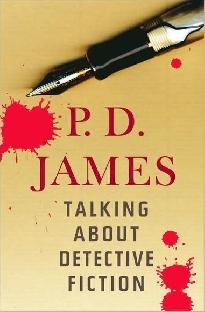
I know. We is a terrible Jane Austen blog because we did not post on Jane Austen’s birthday! Miss Austen, ladies and gentlemen, please forgive us! But maybe on her 234th bday, Miss Austen wouldn’t see being a day or two late as being very late at all? . . . No, you’re right, I’m sure she was a stickler about that sort of thing. Anyway, Happy Belated Birthday, Miss Austen!
Mystery author P.D. James has a new book out, Talking About Detective Fiction, and this book contains, I think, a birthday present for Jane Austen. P.D. calls Emma “the most interesting example of a mainstream novel which is also a detective story.” What is the secret in the novel? Of course it is the “unrecognized relationships” between characters caught up in Emma’s romantic machinations, says Lady James, adding: “The story is confined to a closed society in a rural setting, which was to become common in detective fiction, and Jane Austen deceives us with cleverly constructed clues.” I’ve read mystery stories my whole life, and I’d never thought of that. At last, a fresh voice in Austen debate! (Unless this is well-known in academic circles, and I just missed it?) And it’s true. Critics are usually so caught up in hating Emma to bits that they don’t talk about the craft that Jane Austen uses to give us these situations that can be read in a number of ways. And she plays fair—if you know, you can see the significance of Frank Churchill’s going to get his hair cut and Mr. Elton’s giving the poem to Emma instead of Harriet. But, and this is the mark of a good detective story, the first time around, I completely misread those clues! I totally bought Emma’s reasoning about Mr. Elton and missed all Jane Fairfax’s telltale blushes. How about you? Are the Emma-haters so angry because they were deceived by her too?
Interestingly, there’s also a mystery in Northanger Abbey, at least in Catherine’s mind: the mystery of Mrs. Tilney’s death. But this mystery, Jane Austen’s avatar Henry Tilney tells us, is ridiculous—it’s too like a Gothic novel to believe that a wife could be killed under the eyes of a physician, or locked up without anyone’s protesting! Miss Brontë and we think differently, and the long lineage of detective and Gothic/horror stories certainly has something to do with that. But Jane Austen sympathizes a lot more with Emma’s self-deception than she does with Catherine’s.
It’s too like a Gothic novel. . . Jane Austen liked those, but she thought they were silly (hence Northanger Abbey). She followed the old adage about writing what you know about, and not about long ago and far away with monstrous creations wreaking havoc. She appreciated girls trapped by monstrous men in exotic Italian castles hundreds of years ago, so I think she would understand our fascination with girls trapped by werewolves in exotic English country houses two hundred years ago. But there’s no doubt she’d think it and us more than a bit silly. I wish she were here to tell us how much. But at least now someone is appreciating her real sense of mystery.
I wonder what she would have thought about cutesy-wootesy irritatingly depressed Tiger Beat Vampire Love Story books and movies?
PD James never ceases to thrill me in one way or another. Dagliesh was really out of another era, and I though of him as a more “Victorian” kinda guy. He figures out crimes, he writes poetry, he loves fine methods of transportation. He is neither overly emotional nor overtly macho. He had a brain in his head. All of Jame’s novels feature interesting women. (I’ve never read any Cordelia Gray, though). Finally, her mysteries tend to be focused on people in closed or close communities of some sort, and how they deal with each other!
Lotsa connections.
Do I sound less intelligent using slang?
LikeLike
@Didee: Yeah, she would have just thought they were lazy.
I’ve never actually read any P.D. James, though I’ve seen some of the BBC versions. My mom says they’re very depressing b/c no one does anything from any but the worst motives.
Hmm… maybe Dagliesh is based on Mr. Darcy?
Certainly that “closed community” thing is part of the deal in classic mysteries.
Yeah, ya kinda do sound less intelligent usin’ slang. 🙂
LikeLike
I am a devoted James fan, and read her work over and over. Her book is on my Christmas list this year and I’m not surprised she discusses Emma. There is also is an extended analogy to Persuasion in the books in which Dalgliesh finally reveals his feelings for the much younger (and perhaps not uncoincidentally named) Emma Levenham.
While I loved the reference to Persuasion, I confess I was holding out for him and Cordelia Gray, a connection James teases us with in the earlier books but then does not follow through on.
And Mrs. Fitzpatrick, as a woman of taste and sensibility, you absolutely should be reading James. (Work chronologically, according to publication date.)
She has much in common with Austen–a master plotter, a brilliant stylist, and a keen observer of human nature.
LikeLike
Thanks for the tip, Rosemary, I will have to check her out! What would you say to my mom’s criticism of her being too cynical about people’s motives? I’m curious…
LikeLike